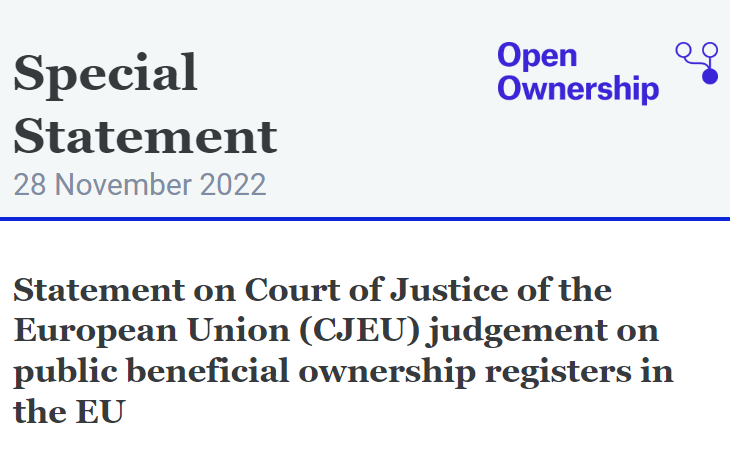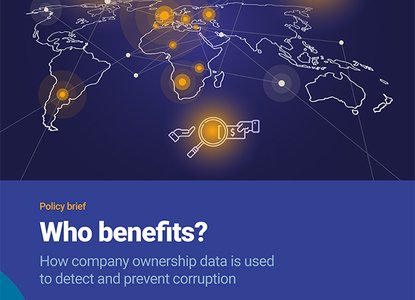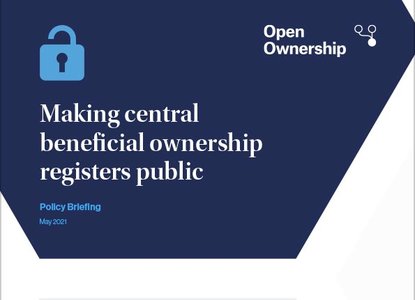Statement on Court of Justice of the European Union (CJEU) judgement on public beneficial ownership registers in the EU

Countries around the world are in the process of legislating for public beneficial ownership registers. Many are looking to the Court of Justice of the European Union (CJEU) ruling of 22 November 2022 regarding public access to these registers, and asking what it means for them.
The judgement ruled that “the provision whereby the information on the beneficial ownership of companies incorporated within the territory of the Member States is accessible in all cases to any member of the general public is invalid” (emphasis added).
The CJEU judgement does not say that public access is never justified, but it does underscore the importance of appropriately balancing privacy concerns with the public interest benefits arising from public access to beneficial ownership information. The ruling is specific to the EU context and legislation, and says that the legal approach taken in the EU 5th Anti-Money Laundering Directive does not appropriately balance privacy and public access, and that public access was not sufficiently justified solely for the purpose of fighting financial crime.
Globally, countries are facing fast-evolving threats from money laundering and corruption. These are undermining democracy, prosperity, and national security. Now is not the time to weaken the world’s defences. The influence of this judgement is already being felt around the world, particularly given the EU’s leadership role on beneficial ownership transparency to date.
Internationally, the evidence is clear: public registers of beneficial ownership information deliver benefits for anti-corruption, provide a fair and transparent trading environment for businesses, and help increase trust in government. In practice, giving easy access to this information is by far the most efficient way to ensure all relevant users – from investigative journalists to foreign law enforcement officials – can access and use beneficial ownership information and achieve their aims.
Privacy and public interest
Owning a company is not an inherently private affair. Forming a company grants benefits to the individuals involved, such as limited liability. These benefits are granted by the state, and in exchange, it is reasonable for society to know who is benefitting. Companies may also receive public funds or operate in sectors such as natural resources, meaning information about who owns and controls companies is fundamental for oversight and accountability.
Collectively, we need to make full use of proven tools like beneficial ownership transparency to support integrity in our markets and help combat challenges like corruption. Open Ownership is analysing the content and implications of the judgement in detail and is actively contributing to debates within and beyond the EU. We eagerly await a response from the European Commission and will continue to work with our partners to understand the implications of the judgement.
What action should be taken now?
- Leaders and supporters of beneficial ownership transparency should champion the clear benefits of public registers, and the varied legislative and policy approaches that are being taken to balance public access with protecting privacy. These messages and case studies need to feature prominently in international fora and national dialogues.
- The Council of the EU, the European Commission and European Parliament should engage in urgent discussions with EU civil society about this ruling, and how less restrictive access to registers could be restored as part of the 6th Anti-Money Laundering Directive, currently under consideration. Given the influence of EU policy around the world, a statement to show the Commission's leadership by example on this agenda would also reassure non-EU countries that action is being taken.
- Governments that are currently implementing public beneficial ownership registers should draw lessons from this judgement, where they are relevant to their context, for example applying the principle of data minimisation in combination with layered access to balance privacy with public access, and the benefit of legislating for public access using a broadly defined basis of accountability and public interest. Governments can continue to draw on Open Ownership’s resources on privacy and access.
- Beneficial ownership transparency practitioners should continue to innovate and develop new ways to ensure public access is proportionate. Beneficial ownership transparency is still a nascent area of policy reform. As a growing number of countries are implementing it, they are developing new solutions. For example, access regimes could add additional tiers to their layered access approach for specific user groups, or explore the use of unique identifiers to minimise the personal data that is made available.
More resources from Open Ownership
As many investors seek to address near term pressures and pivot to the renewable energy sector, this report makes the case that beneficial ownership transparency must be a key accountability tool to enable a sustainable energy transition.
February 2022: Early impacts of public beneficial ownership registers: Ukraine | openownership.org
In 2015, Ukraine became the first country in the world to launch a public register of the beneficial owners of corporate entities registered in the country. Their experience also exemplifies the importance of making beneficial ownership data public.
February 2022: Early impacts of public registers of beneficial ownership: Slovakia | openownership.org
Slovakia was an early adopter of transparent registers of company ownership. It overcame many challenges to do this and this report outlines how they went about it.
December 2021: Using beneficial ownership data for national security | openownership.org
This briefing sets out how beneficial ownership transparency can help mitigate a range of national security threats from state and non-state actors by integrating structured and interoperable beneficial ownership information with other data sources, and making this available to a range of different actors to effectively counter security threats.
May 2021: Making central beneficial ownership registers public | openownership.org
This policy briefing outlines the benefits that arise from making a beneficial ownership register public, and looks at how different user groups are better able to use such data.
April 2021: Early impacts of public registers of beneficial ownership: United Kingdom | openownership.org
The UK was the first country in the world to commit to making beneficial ownership transparent. In 2016 it launched its public beneficial ownership – or Persons of Significant Control (PSC) – register. PSC data is widely used, and has been critical in investigations into financial crime and terrorism-related offences. This report provides details of the UK’s approach and case studies of the impact it has had.
March 2021: Beneficial ownership data in procurement | openownership.org
This policy briefing outlines the main ways beneficial ownership data can improve public procurement processes and objectives, and discusses some of the key considerations and decisions that implementers face.
May 2019: Data Protection and Privacy in Beneficial Ownership Disclosure | openownership.org
This report considers data protection and privacy laws that relate to public beneficial ownership data, evaluated both from the perspective of the companies holding that information as well as the authorities requiring it to be disclosed publicly.
Related articles and publications
Publication type
News article
Open Ownership Principles
Access

